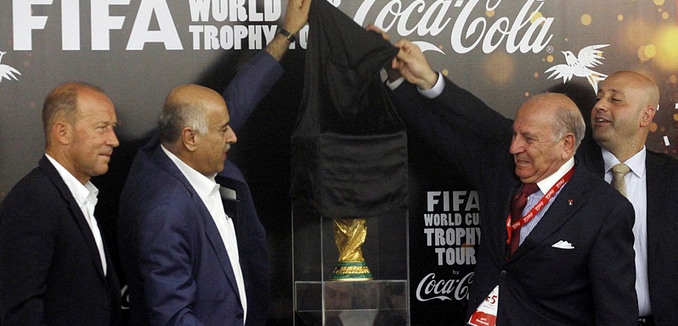Last month’s unsuccessful attempt by the Palestinian Authority to suspend Israel from FIFA, the governing body of international soccer, is part of a broader anti-Israel campaign being orchestrated by Qatar, according to a paper published Tuesday by Pinhas Inbari of the Jerusalem Center for Public Affairs.
Inbari explained that Qatar supports Palestinian Football Association head Jibril Rajoub to succeed Mahmoud Abbas as Palestinian Authority President Mahmoud Abbas. Rajoub led the campaign against Israel in FIFA.
Rajoub’s activity reveals another dangerous aspect of Qatar’s policy, also consistent with Bishara’s outlook: the Muslim Brotherhood’s penetration into the West Bank, Israel, and Europe by means of soccer.
Rajoub’s counterpart in Gaza – and according to Palestinian sources, his unofficial deputy – is Abd al-Salam Haniyeh, son of the Hamas prime minister in Gaza, Ismail Haniyeh (who was himself a soccer player). In light of the fact that soccer activity in Gaza is under Hamas auspices, the demand that Israel grant freedom of movement to Gazan soccer players basically entails allowing Hamas personnel to enter the West Bank.
Qatar’s backing of Rajoub as Abbas’s successor, then, points to a real possibility that Rajoub will allow Hamas to infiltrate the West Bank. Rajoub, in his days as commander of Preventive Security, was known for cracking down hard on Hamas; it is possible that Qatar mediated reconciliation between him and the movement.
Inbari noted that the campaign against Israel within FIFA is a signal that “whenever the Palestinians join an international organization, sooner or later they will demand that Israel be expelled from it.” In FIFA, the Palestinians, and the Future of World Football, which was published in the June 2015 issue of The Tower Magazine, assistant editor Aiden Pink made a similar point:
Rajoub’s gambit was another facet of the Palestinian Authority’s escalating efforts to isolate and delegitimize Israel in bodies like the UN Human Rights Council and the International Criminal Court—politicizing organizations that could theoretically serve a noble purpose if they weren’t so consumed with anti-Israel animus….
Following 15 years in prison for throwing a grenade at Israeli soldiers, Rajoub was freed in 1985 along with 1,149 other prisoners in exchange for three Israelis taken hostage by the Popular Front for the Liberation of Palestine. Rajoub threw away his newfound freedom by resuming (and being repeatedly arrested for) militant activities in the ensuing two years. He eventually became an aide to Yasser Arafat, serving as the head of the Palestinian Authority’s Preventive Security Force after Arafat’s post-Oslo return to the West Bank. As security chief, Rajoub was frequently accused of facilitating the torture of prisoners and political opponents. In addition to the PFA, he also heads the Palestinian Olympic Committee, which he has used as a perch to demand Israel’s expulsion from the global sports movement. Unlike most sports administrators, who believe in (or at least talk publicly about) the capacity for sports to unite people of different backgrounds, Rajoub has promoted no such pretense—he has said that Palestinian sports are “one of the methods of resistance” against Israel, and has emphasized that Palestinian youth—over whom he holds a good deal of influence as the PA’s sports czar—have a key role in creating a “permanent state of confrontation.” For example, a 2010 youth soccer tournament run under the auspices of the PFA—and attended by the PFA’s secretary-general “as a representative of Jibril Rajoub,” according to the official PA newspaper Al-Hayat al-Jadida—was called “The Prince of Martyrs Khalil al-Wazir 16th Football Tournament.” Al-Wazir, also known as Abu Jihad, was the mastermind of numerous terrorist attacks, including the deadliest one in Israel’s history, the 1978 Coastal Road massacre, in which 38 civilians, including 13 children, were killed in a bus hijacking.
Qatar also hosts and supports Azmi Bishara, a former Israeli-Arab politician and suspected spy for Syria, who opposes the integration of Arabs into Israeli society. Inbari observed that Rajoub, like Bishara, “den[ies] the 1967 borders’ validity when it comes to the Israeli Arabs.” While Inbari doesn’t say it explicitly, he suggested that Qatar is promoting Palestinian elements who oppose a peaceful two-state solution with Israel.
Qatar, which is scheduled to host the 2022 World Cup, has long been accused of using soccer to advance its questionable political purposes, as contributing editor Ben Cohen documented in The Fruitful Game: How Qatar Uses Soccer to Polish Its Image, which was published in the October 2014 issue of The Tower Magazine:
“Qatar is playing a double game,” Haras Rafiq, the outreach officer for the Quilliam Foundation, a counter-extremism think tank based in London, told me. “On the one hand, its rulers are promoting a positive image of the country by, for example, hosting the 2022 World Cup and sponsoring Barcelona. On the other hand, they’re supporting and harboring extremism and terrorism in the Middle East and around the world. They also operate what I would term ‘apartheid-like’ policies domestically—go there, and you’ll see shopping malls that are for Arabs only. I, as a Muslim of Pakistani descent, can’t go into those malls.”
The most savage of Qatar’s apartheid-esque qualities lies in the treatment of its 1.4 million migrant workers. Over the last two years, reports have repeatedly emerged of barbaric working conditions in the World Cup stadiums under construction, of unsanitary and crowded living quarters, and of the myriad abuses enabled by a labor relations system, known as the kafala, which converts the employer-worker relationship into a master-slave one. A government-issued report admitted that nearly 1,000 South Asian migrant workers died in 2012 and 2013; workers who built the 43-story al-Bidda Tower, which contains the headquarters of Qatar’s World Cup organizing committee, weren’t paid for over 13 months.
[ Photo: Issam Rimawi / FLASH90 ]




